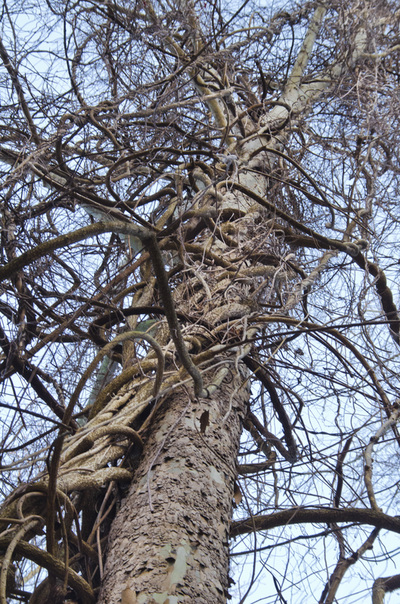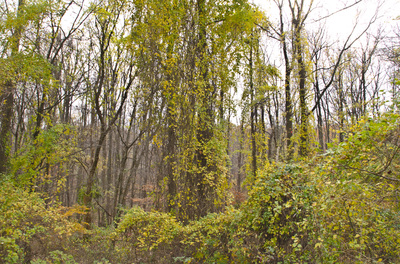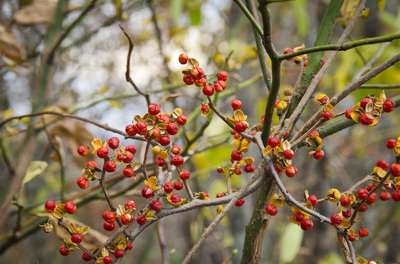by Susan Austin Roth, VMN – Arlington Regional Chapter and Blue Ridge PRISM volunteer
Note: Click on a photo above to see the captions.
Whenever you hike in a local park or state wildlife preserve, or drive along Virginia’s scenic byways, are you appalled by the obvious destruction done by invasive plants? Everywhere one goes these days, it seems the landscape is overrun with invasive vines shrouding and strangling trees and invasive shrubs and grasses obliterating the native plants we should be seeing. Unfortunately, the horror scene you observe goes unnoticed by most of the public, who thinks green is good and the unnatural is the way it should be and always has been.
If you are a keen devotee of Virginia’s forests, fields and working farms, perhaps you already volunteer in the effort to combat nonnative invasive plants by leading hand-to-hand combat efforts in a local park. But here’s another way you can help the effort on a much larger scale. A new organization dedicated to fighting nonnative invasive plants, the Blue Ridge PRISM (Partnership for Regional Invasive Species Management) needs volunteer help from Master Naturalists with knowledge about invasive plants and an interest in outreach to consult with landowners. If you volunteer, you would identify invasive plants on the landowners’ properties, distribute literature, and assist landowners in applying for PRISM grants for invasives control. The Blue Ride PRISM is also looking for volunteers to join a task force in scouting for wavyleaf grass in areas near known infestations. Training will be provided. If you do not reside in an area served by the Blue Ridge PRISM, you might consider organizing interested people to establish a similar organization in another region of the commonwealth.
The Blue Ridge PRISM is a young, but fast-maturing, nonprofit organization dedicated to raising community awareness and leading control efforts to combat invasive plants in 10 counties located on both sides of the Shenandoah National Park. It is the first CWMA (cooperative weed management area) headquartered in Virginia. Nationally, there are more than 100 such organizations, most of them in the West. The ten counties included in the Blue Ridge PRISM’s geographical range are: Albemarle, Augusta, Clarke, Greene, Madison, Nelson, Page, Rappahannock, Rockingham and Warren.
The Blue Ridge PRISM began in 2014 as a gleam in the eyes of Rod Walker, a landowner in Albemarle County whose forested land was being wrecked by exotics, and Jake Hughes, Exotic Plant Management Biological Science Technician for Shenandoah National Park. Now, more than 30 people sit on its advisory board, making up a broad-based coalition of private landowners, nonprofit organizations, for-profit business owners, university faculty, and local, state and federal agencies. These stakeholders have formed nine working groups, which have made great strides in moving this organization forward. Grant awards are pending and the funds will be put to work on many fronts, including education and outreach, and control and restoration implemented through the PRISM’s unique Area Stewards program.
Effective invasives control is a community and neighborhood issue, because these aggressive plants know no boundaries – flowing water, birds, hikers, vehicles, and animals scatter and spread their seeds like a contagious disease. Steps can be taken to eradicate invasive plants from a park or private property only to have the area rapidly become re-infested from neighboring land. Community-wide action is needed. Through cooperative efforts, the Blue Ridge PRISM aims to enable citizens to reclaim the region’s natural heritage and become good stewards of the land.
The Blue Ridge PRISM’s Area Stewards program is at the heart of its mission; control measures will focus on areas where members and volunteers encourage neighboring property owners to work together to create large areas of control. This cooperative program among neighbors and communities will create islands of invasive-free land that will reduce the likelihood of reinfestation. As more neighboring properties join the effort, the amount of invasive-free land will expand. One Greene County Area Steward just completed the first year of control of Japanese stiltgrass on several hundred acres of five adjoining properties. Two Area Stewards are organizing work in Albemarle County, one on ailanthus and another on bittersweet.
The PRISM is concentrating on controlling the worst invasives in the Blue Ridge. The “terrible twelve” are: ailanthus (tree of heaven), autumn olive, bush honeysuckle, Chinese privet, garlic mustard, Japanese honeysuckle, Japanese stiltgrass, kudzu, mile-a-minute, multiflora rose, oriental bittersweet, and porcelainberry, with an Early Detection Rapid Response effort targeted at wavyleaf grass.
Master Naturalists can significantly help in furthering the Blue Ridge PRISM’s mission by volunteering to become Area Stewards, helping to staff events, and scouting for wavyleaf.
If you are interested in volunteering for education and outreach, please contact Ruth Douglas at 434-293-6538 or cvilleruth@embarqmail.com or Rod Walker at rwalker@alum.mit.edu. To volunteer to become an Area Steward or in your community or a wavyleaf scout, please contact Jim Hurley at jehurley@mindspring.com. See the Blue Ridge PRISM’s evolving website at www.blueridgeprism.org.
If you are a keen devotee of Virginia’s forests, fields and working farms, perhaps you already volunteer in the effort to combat nonnative invasive plants by leading hand-to-hand combat efforts in a local park. But here’s another way you can help the effort on a much larger scale. A new organization dedicated to fighting nonnative invasive plants, the Blue Ridge PRISM (Partnership for Regional Invasive Species Management) needs volunteer help from Master Naturalists with knowledge about invasive plants and an interest in outreach to consult with landowners. If you volunteer, you would identify invasive plants on the landowners’ properties, distribute literature, and assist landowners in applying for PRISM grants for invasives control. The Blue Ride PRISM is also looking for volunteers to join a task force in scouting for wavyleaf grass in areas near known infestations. Training will be provided. If you do not reside in an area served by the Blue Ridge PRISM, you might consider organizing interested people to establish a similar organization in another region of the commonwealth.
The Blue Ridge PRISM is a young, but fast-maturing, nonprofit organization dedicated to raising community awareness and leading control efforts to combat invasive plants in 10 counties located on both sides of the Shenandoah National Park. It is the first CWMA (cooperative weed management area) headquartered in Virginia. Nationally, there are more than 100 such organizations, most of them in the West. The ten counties included in the Blue Ridge PRISM’s geographical range are: Albemarle, Augusta, Clarke, Greene, Madison, Nelson, Page, Rappahannock, Rockingham and Warren.
The Blue Ridge PRISM began in 2014 as a gleam in the eyes of Rod Walker, a landowner in Albemarle County whose forested land was being wrecked by exotics, and Jake Hughes, Exotic Plant Management Biological Science Technician for Shenandoah National Park. Now, more than 30 people sit on its advisory board, making up a broad-based coalition of private landowners, nonprofit organizations, for-profit business owners, university faculty, and local, state and federal agencies. These stakeholders have formed nine working groups, which have made great strides in moving this organization forward. Grant awards are pending and the funds will be put to work on many fronts, including education and outreach, and control and restoration implemented through the PRISM’s unique Area Stewards program.
Effective invasives control is a community and neighborhood issue, because these aggressive plants know no boundaries – flowing water, birds, hikers, vehicles, and animals scatter and spread their seeds like a contagious disease. Steps can be taken to eradicate invasive plants from a park or private property only to have the area rapidly become re-infested from neighboring land. Community-wide action is needed. Through cooperative efforts, the Blue Ridge PRISM aims to enable citizens to reclaim the region’s natural heritage and become good stewards of the land.
The Blue Ridge PRISM’s Area Stewards program is at the heart of its mission; control measures will focus on areas where members and volunteers encourage neighboring property owners to work together to create large areas of control. This cooperative program among neighbors and communities will create islands of invasive-free land that will reduce the likelihood of reinfestation. As more neighboring properties join the effort, the amount of invasive-free land will expand. One Greene County Area Steward just completed the first year of control of Japanese stiltgrass on several hundred acres of five adjoining properties. Two Area Stewards are organizing work in Albemarle County, one on ailanthus and another on bittersweet.
The PRISM is concentrating on controlling the worst invasives in the Blue Ridge. The “terrible twelve” are: ailanthus (tree of heaven), autumn olive, bush honeysuckle, Chinese privet, garlic mustard, Japanese honeysuckle, Japanese stiltgrass, kudzu, mile-a-minute, multiflora rose, oriental bittersweet, and porcelainberry, with an Early Detection Rapid Response effort targeted at wavyleaf grass.
Master Naturalists can significantly help in furthering the Blue Ridge PRISM’s mission by volunteering to become Area Stewards, helping to staff events, and scouting for wavyleaf.
If you are interested in volunteering for education and outreach, please contact Ruth Douglas at 434-293-6538 or cvilleruth@embarqmail.com or Rod Walker at rwalker@alum.mit.edu. To volunteer to become an Area Steward or in your community or a wavyleaf scout, please contact Jim Hurley at jehurley@mindspring.com. See the Blue Ridge PRISM’s evolving website at www.blueridgeprism.org.



